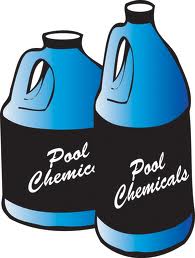Water Chemistry the Crowe Pool Service Way
H2O Chemistry (like what I did there), although not the most intriguing subject, is by far the most important aspect of pool ownership and service. Balanced water ensures safe, clear water that will save your skin and eyes and your pool’s equipment and finish.
The proper treatment and balancing of your pool water is a challenging task due to the large number of variables in effect, these include: dust & dirt, dissolved organics, number of bathers, animals, weather, and even the chemicals we add – just to name a few.
When we talk about balanced water, we are trying to obtain an equal amount of acids and alkalis while maintaining an appropriate level of sanitizer to fight germs. To achieve this goal of balance, we must know which factors we can control.
Let’s examine the aspects of good water chemistry.
- pH – pH is the measure of acidity in the water. The pH scale ranges from 0-14. The lower end of the scale indicates acidity and the higher end indicates a basic solution. The standard for pH (what you get with other pool companies) is between 7.2 – 7.8. The ideal (what you get with Crowe Pool Service) is between 7.4 – 7.6.
- Alkalinity – Total alkalinity is a measurement of alkaline compounds, which produce basic solutions when ionized. When these compounds ionize they act as buffers and are capable of holding the pH steady. Total alkalinity is the buffering capacity of water. We find that the majority of pools that we service for the first time, whether serviced previously by the homeowner or another pool company, do not have alkalinity anywhere near the standard range. The standard range for total alkalinity is 60 parts per million (ppm) to 180 ppm. The ideal range (what you get with Crowe Pool Service) is 80 to 100 ppm.
- NOTE – Unlike many other companies, Crowe Pool Service does not have an additional monthly charge for the chemicals that we add to the pool. These companies claim to have a lower monthly rate, but then they charge you an additional fee for chemicals. Follow me here. They also do not take care of your pool’s total alkalinity, so your pH is all over the place and each week it needs either Muriatic acid or soda ash to adjust the pH. They, in turn, can charge you for chemicals that you would otherwise not need – what a racket!
- Total Hardness – A measurement of the mineral salts, most commonly calcium, present in the water. The ideal level of total hardness is 200 to 400 ppm. When hardness reaches 500+ ppm the pool should be at least partially drained. In order to raise calcium hardness, calcium chloride must be added.
- Total Dissolved Solids (TDS) – High TDS is one of the primary sources of cloudiness in pools, and includes everything chemical that exists in a soluble form. The ideal TDS level is 1,000 to 2,000 ppm. When your pool achieves a TDS level above 1,500 ppm your chlorine efficiency is reduced by up to 50%. The only way to deal with high TDS is partial draining and refilling.
Marv, our resident genius, has developed a program unique to each pool for attaining ideal ranges in all of the chemistry aspects listed above. This means that we are not playing guessing games with your water each week in order to finally get it to that standard range (what you can expect with other pool companies). Crowe Pool Service gathers specific readings of your water chemistry and adjusts with specific amounts of chemicals in order to get your pool balanced in the ideal range. In turn, you are getting the best water for your skin and eyes, and your equipment and finish.
So, do you still think all pool companies are the same?
Let us know if you have any questions or comments. You can post them in the comments sections at the bottom of the page.
Until next time, keep you head above water.
Ryan
AUG


About the Author:
Ryan currently resides in St Augustine where he is co-owner of Crowe Pool Service.